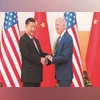After summit bonhomie, Biden & Xi Jinping vie to woo FDI from Asia-Pacific
Xi's pitch for foreign capital came as China posted its first deficit in foreign investment
)
Representative Image
Listen to This Article
After a display of rare bonhomie at their meeting on Thursday, US President Joe Biden and his Chinese counterpart Xi Jinping have fiercely courted investments from the leaders and CEOs attending the Asia-Pacific summit to entice foreign capital.
Facing a doubting task of reviving a once buoyant economy with the steady outflow of foreign companies and supply chains Xi, in his address at the APEC CEO summit in San Francisco pledged to tear down foreign investment barriers and promised to invite foreign capital with "heart-warming" measures.
"No matter how the international situation evolves, China's resolve to foster a market-oriented, law-based and world-class business environment will not change, Xi said in written remarks to the Asia-Pacific Economic Cooperation (APEC) CEO Summit on Thursday.
China's policy of providing equal and quality services to foreign investors will not change, he said.
We will strive to tear down the barriers to the flow of innovation factors, deepen reform of the digital economy, and promote free and orderly flow of data in compliance with the law, Xi, who held a surprisingly cordial and fruitful summit with Biden, said.
Also Read
Their summit sparked speculation of a subtle shift in US-China power dynamics as the two largest economies in the past few years were at loggerheads to gain the upper hand, especially in the Indo-Pacific region.
Xi, 70, promised that China would implement more heart-warming measures, such as improving the policies on entry and retention of foreign nationals in China and removing choke points in financial, medical, e-payment and other services.
Allaying fears, he also pledged to improve the protection of foreign investors' rights and interests, further shorten the negative list on foreign investment, fully ensure equal treatment for foreign investors and continue to strengthen intellectual property rights protection.
His address, which was full of promises, came as foreign companies continued to leave and downsize their investments in China amid diminished confidence, while concerns rose about heightened national security scrutiny.
Xi's pitch for foreign capital came as China posted its first deficit in foreign investment.
China's quarterly balance sheet for international payments, grabbed headlines this month when it fell into the red the first time China has recorded an investment deficit since the data started being recorded in 1998.
Zhou Xin, a columnist for the Hong Kong-based South China Morning Post, said that analysts cited the deficit of USD 11.8 billion for the third quarter as a sign of battered foreign investor confidence in the world's second-largest economy.
A deficit means money from investors is leaving the country through ways that include repatriating profits to head offices outside China instead of reinvesting in domestic operations, Zhou said in his recent column in the Post.
In a broad sense, this suggests that de-risking efforts by the US and its allies are starting to have an effect, possibly weakening China's economic standing. This is not a welcome sign for China, he said.
Addressing the APEC CEOs meeting, Biden also made a strong pitch for investments from Asia Pacific promising that the US is committed to high standards in trade and to partnerships that will benefit economies across the Pacific.
We're not going anywhere, Biden, 80, said and downplayed the fierce competition with China, stating that the US was de-risking and diversifying but not "decoupling from Beijing.
Asserting America's Asia-Pacific credentials, Biden said Xi asked him during their talks on Wednesday why I-we are so engaged in the Pacific. It's because we're a Pacific nation. And because of us, there's been peace and security in the region, allowing you to grow. He didn't disagree. By the way, it was a very good, straightforward meeting.
We aren't going anywhere. For decades, America's enduring commitment to the region has been a springboard that's enabled growth transformative growth, ensured the open flow of commerce, and lifted millions of people out of poverty, Biden said.
He said the US companies had invested some USD 50 billion in fellow Asia-Pacific Economic Cooperation economies in 2023, including in clean energy technologies, aviation and cybersecurity.
The United States has deep ties with our fellow APEC economies. More than 60 per cent of US exports go to fellow APEC economies, he said.
(Only the headline and picture of this report may have been reworked by the Business Standard staff; the rest of the content is auto-generated from a syndicated feed.)
More From This Section
Don't miss the most important news and views of the day. Get them on our Telegram channel
First Published: Nov 17 2023 | 7:06 PM IST


